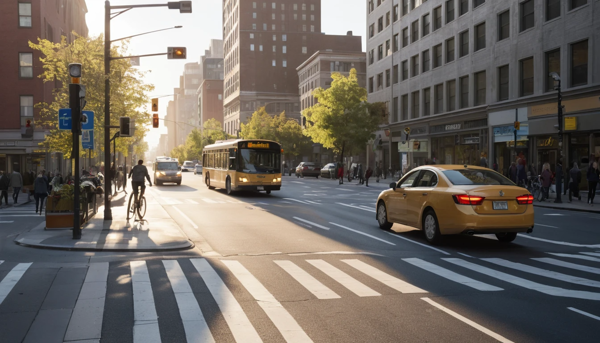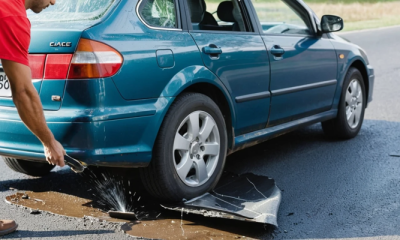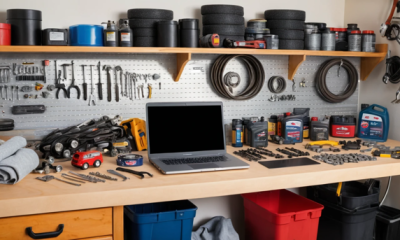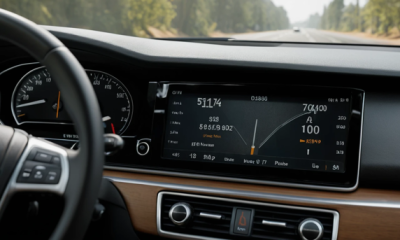Driving Tips
Defensive Driving Techniques for City Traffic – Proven Smart Tips

Defensive driving techniques for city traffic can save lives. Learn smart, practical tips for safer, stress-free urban driving.
Defensive Driving Techniques for City Traffic – Proven Smart Tips
🚗 Ever feel like you’re in a real-life video game when driving in the city? One wrong move and you’re dealing with honking horns, jaywalkers, sudden stops, and bumper-to-bumper chaos. City driving is no joke. But there’s good news—you can stay safe (and sane) by learning defensive driving techniques for city traffic.
Let’s dive into how you can drive smarter, stay more alert, and avoid those stressful situations altogether.
What Is Defensive Driving? 🤔
At its core, defensive driving means being prepared for the unexpected. You’re not just driving for yourself—you’re driving for everyone around you too.
It’s all about:
- Anticipating other drivers’ moves
- Staying alert at all times
- Reducing risks
- Making safe decisions before problems arise
Whether it’s a pedestrian darting across the road or someone cutting you off without signaling, defensive driving helps you avoid collisions.
Why It Matters More in the City 🏙️
City traffic is a beast. You’ve got:
- Heavy congestion
- Buses making sudden stops
- Cyclists weaving through lanes
- Delivery vans blocking intersections
These unpredictable elements make defensive driving essential. You’re not just avoiding accidents—you’re protecting lives.
Stay Focused—Always 👀
Distractions are your enemy. In urban areas, even a two-second glance at your phone can lead to disaster.
Quick tips to stay focused:
- Put your phone on silent or Do Not Disturb mode
- Avoid multitasking (no eating, adjusting GPS, or fiddling with the radio)
- Keep your eyes moving and scan your surroundings constantly
Maintain a Safe Following Distance 🚗↔️🚗
In city traffic, tailgating is a recipe for rear-end collisions. Leave enough space to react if the car ahead stops suddenly.
Rule of thumb:
- Keep at least a 3-second gap in light traffic
- Increase to 4–5 seconds in heavy congestion or bad weather
Anticipate the Unexpected ⚠️
You never know what’s coming next in city traffic. Assume the worst and be ready for it.
Look for:
- Cars merging without signaling
- Pedestrians crossing between parked cars
- Sudden stops from rideshare vehicles
Use Mirrors and Blind Spot Checks 🔄
Constantly checking mirrors helps you stay aware of:
- Motorcycles coming up fast
- Bicyclists in your blind spots
- Vehicles trying to squeeze into tight spaces
👉 Turn your head to check blind spots before changing lanes.
Don’t Rush—Plan Ahead 🕐
Running late? That’s when mistakes happen. Leave early so you’re not pressured to speed or make reckless choices.
Planning tips:
- Check traffic reports before heading out
- Use navigation apps with real-time updates
- Allow extra time for detours and delays
Know Your Route Beforehand 🗺️
City roads can be confusing. They have one-ways, dead ends, and construction zones. Take time to review your route in advance.
Benefits:
- Fewer last-minute lane changes
- Reduced stress
- Safer driving decisions
Be Extra Cautious at Intersections 🚦
Intersections are hot zones for accidents.
Here’s what to do:
- Look both ways—even if the light is green
- Watch for red-light runners
- Yield to pedestrians and cyclists
“Green doesn’t always mean go—sometimes it means look twice.”
Use Your Signals—Every Time ✋
Turn signals aren’t optional—they’re essential. Let others know what you plan to do.
Always signal when:
- Turning
- Changing lanes
- Merging into traffic
Be Patient with Pedestrians 🚶♀️🚶♂️
In the city, people are everywhere. Some will jaywalk. Others will dart across the road without warning.
How to stay safe:
- Slow down near crosswalks
- Expect unpredictable movements
- Always yield—even if they’re in the wrong
Respect Cyclists and Motorcyclists 🛵🚴♂️
Two-wheeled travelers are vulnerable. Give them space.
Defensive habits to adopt:
- Don’t crowd them in lanes
- Double-check before turning right
- Never open your car door without looking
| City Driving Risks | Defensive Driving Responses |
|---|---|
| Sudden stops from taxis | Keep a safe following distance |
| Jaywalking pedestrians | Drive slower near crosswalks |
| Aggressive drivers | Don’t engage—stay calm |
| Delivery trucks in your lane | Be patient—wait or go around safely |
Adjust for Weather Conditions 🌧️❄️
Rain, fog, or snow makes city driving even trickier. Defensive driving helps you avoid hydroplaning, slipping, or not stopping in time.
Tips for bad weather:
- Drive slower
- Use headlights
- Increase following distance
Keep Your Cool in Traffic 😤
City traffic can be infuriating. But aggressive driving is dangerous.
Instead, try:
- Breathing exercises
- Playing calming music
- Reminding yourself: “Arriving safe is more important than arriving fast.”
Obey All Traffic Laws 🚫
Red lights, speed limits, and road signs are there for a reason. Follow them every single time.
Key reminders:
- Stop fully at red lights and stop signs
- Don’t block intersections
- Respect right-of-way rules
| Unsafe Behavior | Defensive Alternative |
| Speeding to make a light | Slow down and wait for the next cycle |
| Swerving between lanes | Stay in your lane and be patient |
| Honking out of frustration | Take deep breaths and stay calm |
| Distracted by phone | Use hands-free or put it away |
Use the Right Lane for Your Speed 🚙
In the city, slower lanes are safer. If you’re unsure about turns or exits, stay in the right lane.
This makes it easier to:
- Pull over if needed
- Yield to emergency vehicles
- Access parking or turns safely
Watch for Emergency Vehicles 🚓🚒🚑
You might not hear them at first. Be alert for flashing lights.
Here’s what to do:
- Pull to the right and stop
- Never block an intersection
- Stay put until they pass
Don’t Depend on Others to Drive Safe 😬
Not everyone’s paying attention. Some are texting, some are aggressive, others are lost.
Drive like no one else knows what they’re doing.
“Defensive driving means expecting the unexpected—every second you’re behind the wheel.”
| Situation | What a Defensive Driver Does |
| Light turns green | Wait a beat and check both directions |
| Someone tailgates you | Move over safely and let them pass |
| Cyclist ahead swerves | Slow down and give them space |
| Lost tourist stops suddenly | Stay alert and brake gradually |
Regularly Maintain Your Vehicle 🛠️
Your brakes, tires, lights, and wipers all play a role in safe city driving.
Check regularly:
- Tire pressure
- Brake condition
- Windshield wiper effectiveness
- All lights (headlights, brake, signals)
Conclusion: Stay Alert, Stay Safe ✅
City traffic is full of surprises. But with the right defensive driving techniques, you’ll stay one step ahead. Keep your focus sharp, your reactions quick, and your attitude calm. Every little decision—every signal, every mirror check—matters.
The city won’t change. But how you drive in it can.
Drive smart. Drive safe. 🛡️
FAQs
What are smart ways to avoid accidents in city traffic?
Stay alert and keep a safe distance. Also, think ahead about what others might do.
How can I stay calm during traffic jams?
Try deep breathing and listen to calming music. Say positive things to yourself too.
What’s the best following distance in busy cities?
Keep 3–5 seconds back from the car in front. This depends on how fast you’re going and the weather.
Why is checking blind spots so important?
City streets have lots of cyclists and scooters. You need to see them before you change lanes.
Is it safer to drive in the right lane in the city?
Yes, it’s safer. It makes it easier to turn, park, and lets others pass you.
Resource:
https://driving-tests.org/beginner-drivers/defensive-driving-tips/
https://www.geico.com/living/driving/auto/car-safety-insurance/defensive-driving-techniques/
-

 Care & Repairs3 weeks ago
Care & Repairs3 weeks agoHandling Vehicle Damage after an Accident: Smart Repair Tips for Peace of Mind
-

 Auto Parts3 weeks ago
Auto Parts3 weeks agoCheapest Online Store For Car Parts – Best Deals Guaranteed
-

 Auto Parts4 weeks ago
Auto Parts4 weeks agoFind Auto Parts Using VIN Number – Fast & Easy Method Today!
-

 Auto Parts3 weeks ago
Auto Parts3 weeks agoUsed Auto Parts with Warranty: Smart, Reliable & Budget-Friendly!






